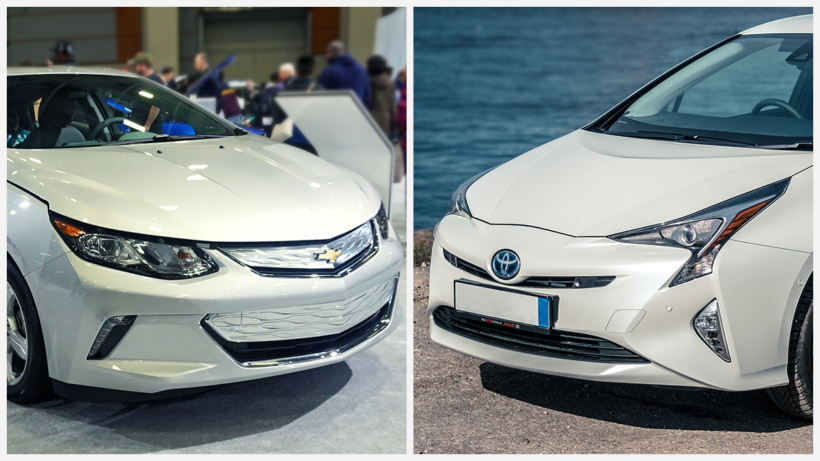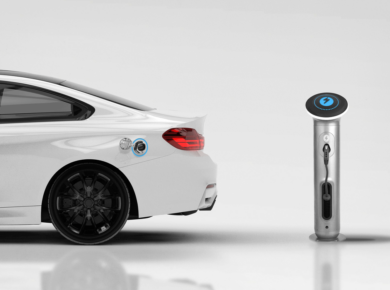BEV, PHEV, FCV: what do they mean?
Lots of acronyms and abbreviations have appeared recently. Each of these denotes a car by its powertrain and fuel/power source.
Let’s define these terms. EV is a shorter term for an electric vehicle. It’s also referred to as a ZEV (Zero Emission Vehicle).
In the case of EVs, the car runs only on electricity produced with the help of electric motors or energy accumulated in the battery. If you want to pick up a bargain EV, we have a wide selection available.
- BEVs (Battery Electric Vehicle) have become popular in recent years. These are powered entirely by their battery. Lithium-Ion or Nickel batteries are an integral part of the chassis. BEVs do not produce exhaust and thus they are considered the most eco-friendly out of the others. There is some controversy regarding the production and re-use of batteries, but the long term effects on the environment are yet to be discovered. Popular examples of completely electric vehicles are the entire Tesla inventory and the Chevrolet Bolt, which is a much more affordable alternative. Want to buy a Tesla? Check out our inventory.
- HEV stands for hybrid electric vehicle. Generally, these are the most widespread type of EVs available today. The powertrain is a fuel-consumption engine aided by a battery. Nonetheless, the range the car can cover on electricity alone is typically low. The braking energy recharges the battery under the bottom of the car. The market is flooded by the well-known Toyota Prius, the most popular HEV in the world. Looking for one? See all of the available salvage and clean title Prius.
- PHEV stands for Plug-In Hybrid Electric Vehicle. They do have an ICE engine and batteries as well, but the main difference is the option to plug your car in to charge it.
Practically, short commutes in urban areas where daily mileage is limited, you can rely on the power of batteries for short distances. On the highway, however, your car switches gasoline consumption, typically over certain speeds. If you’re looking for a PHEV for the whole family, take a look at the Chrysler Pacifica Plug-In Hybrid.
- MHEV stands for Mild Hybrid Electric Vehicle. The role of the electric powertrain here is the lowest and the 48V battery is used only to start and stop. The fuel consumption lowers and the acceleration from a dead start improves because the battery kicks in, providing additional torque. It is becoming more and more popular in luxury manufacturers like Mercedes-Benz and Audi. Dreaming about purchasing a German symbol of prestige and success? Look through available luxury cars.
- And here come exotics: FCEVs that are relatively uncommon. That stands for Fuel Cell Electric Vehicle. The drivetrain can perform on hydrogen or oxygen and the main exhaust is water. Obviously, these cars have to be well-cared of because of the high hydrogen flammability rate.
- In addition, the infrastructure of replenishing stations is not well-developed throughout the world, making traveling with an FCEV difficult. Examples of FCEVs are the Toyota Mirai and Honda Clarity, both of which rarely appear on car auctions, but we may have them on Salvagebid.
Advantages and Disadvantages of Owning an Electric Car
Having an electric car is trendy nowadays for both the cost-effective nature and environmental impact. As a potential bidder, you should be aware of the general advantages and disadvantages of hybrid or EV ownership.
Each type of EV has its own pros and cons. Electric vehicles don’t run on fuel and usually have a bigger range to offer in contrast to PHEVs.
- Owning a BEV also has advantages and disadvantages. The main pluses for BEVs are silent and cost-efficient operation, absence of emissions and mind-blowing acceleration up to 60 mph. Contrary to that, when the battery reaches the end of its life, recycling or disposing of the battery tends to be wasteful.
- In addition, BEVs can be impractical for those who don’t have a charging station close to home. Not to mention charging the battery can take up to several hours. However, manufacturers are regularly increasing the infrastructure of supercharging stations throughout the country to ease range anxiety.
If you’re considering buying a hybrid electric vehicle, the wide variety of options is a definite plus. Great sustainability and efficiency reached at low speeds are good options if you are looking at buying a hybrid, as many run purely on electricity at low speeds. As far as cons go, generally lower power and a smaller electric range are drawbacks for hybrid ownership. For instance, a Toyota Prius can run only 25 miles using electricity, the Chrysler Pacifica has a 32-mile range. Though not the range, but the price of an EV remains the main drawback because it is much more expensive to buy an electric car than a similar ICE model of the same class.
- Plug-in hybrids are also having their own factors to consider. In contrast to HEVs, these offer lower operating costs and the available range is bigger than the available range of BEVs. The downsides are charging-dependant efficiency and running on gasoline without using the plug-in mode that results in increased fuel consumption and lost benefits.
- Mild hybrids can be barely called electric vehicles, though they offer a turbo-lag reduction at low rpms and optimized fuel consumption: a good solution for idle city-driving. Weak spots here are the lack of possibility to run on pure electricity, and the increased price in comparison with the same ICE-equipped models. If you are looking for a car with an ICE engine or any kind of electric vehicle, take a look at our inventory.
- Then there are FCEVs. They provide a great opportunity for long-range driving without the need for a charge. As well as BEVs, they boast almost silent operation and environmentally friendly emissions. However, hydrogen explodes easily and the refueling stations are still relatively limited.
Hybrid or EV?
As automakers continue to move further into hybrid and electric vehicle production, the salvage market will see a tremendous increase in their availability as well.
Both hybrid and EVs have their advantages and disadvantages, so it’s important to weigh the pros and cons of each according to your personal needs. From charging infrastructure to tax credits, there’s a lot to consider. Once you’ve made your decision, you can start looking for EVs on Salvagebid.






